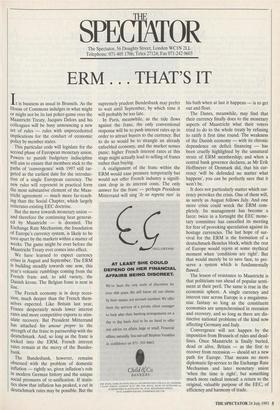SPECT THE AT OR The Spectator, 56 Doughty Street, London WC1N 2LL
Telephone: 071-405 1706; Telex 27124; Fax 071-242 0603
ERM . . . THAT'S IT
It is business as usual in Brussels. As the House of Commons indulges in what might or might not be its last poker-game over the Maastricht Treaty, Jacques Delors and his colleagues will be busy announcing a new set of rules — rules with unprecedented implications for the conduct of economic policy by member states.
This particular code will legislate for the second phase of European monetary union. Powers to punish budgetary indiscipline will aim to ensure that members stick to the paths of 'convergence' with 1997 still tar- geted as the earliest date for the introduc- tion of a single European currency. The new rules will represent in practical form the most substantive element of the Maas- tricht agreement — much more far-reach- ing than the Social Chapter, which largely reiterates existing EEC doctrine.
But the move towards monetary union and therefore the continuing heat generat- ed by Maastricht — is doomed. The Exchange Rate Mechanism, the foundation of Europe's currency system, is likely to be torn apart by the markets within a matter of weeks. The game might be over before the Maastricht Treaty ever comes into effect.
We have learned to expect currency crises in August and September. The ERM is building steadily towards one now, this year's volcanic rumblings coming from the French franc and, to add variety, the Danish krone. The Belgian franc is next in line.
The French economy is in deep reces- sion, much deeper than the French them- selves expected. Like Britain last year, France desperately needs lower interest rates and more competitive exports to stim- ulate recovery. But President Mitterrand has attached his amour propre to the strength of the franc in partnership with the deutschmark. And, so long as the franc is locked into the ERM, French interest rates remain at the mercy of the Bundes- bank.
The Bundesbank, however, remains obsessed with the problem of domestic inflation — rightly so, given inflation's role in modern German history and the unique social pressures of re-unification. If statis- tics show that inflation has peaked, a cut in deutschmark rates may be possible. But the supremely prudent Bundesbank may prefer to wait until September, by which time it will probably be too late. In Paris, meanwhile, as the tide flows against the franc, the only conventional response will be to push interest rates up in order to attract buyers to the currency. But to do so would be to strangle an already enfeebled economy, and the market senses panic: higher French interest rates at this stage might actually lead to selling of francs rather than buying.
A realignment of the franc within the ERM would ease pressure temporarily but would not offer French industry a signifi- cant drop in its interest costs. The only answer for the franc — perhaps President Mitterrand will sing Ve ne regrette rien' in his bath when at last it happens — is to get out and float.
The Danes, meanwhile, may find that their currency finally does to the monetary aspects of Maastricht what their voters tried to do to the whole treaty by refusing to ratify it first time round. The weakness of the Danish economy — with its chronic dependence on deficit financing — has been cruelly highlighted by the unnatural strain of ERM membership; and when a central bank governor declares, as Mr Erik Hoffmeyer of Denmark did, that his cur- rency 'will be defended no matter what happens', you can be perfectly sure that it won't be.
It does not particularly matter which cur- rency provokes the crisis. One of them will, as surely as August follows July. And one more crisis could wreck the ERM com- pletely. Its management has become a farce: twice in a fortnight the EEC mone- tary committee has cancelled its meeting for fear of provoking speculation against its hostage currencies. The last hope of sur- vival for the ERM is the formation of a deutschmark-Benelux block, which the rest of Europe would rejoin at some mythical moment when 'conditions are right'. But that would merely be to save face, to pre- serve a system which is fundamentally flawed.
The lesson of resistance to Maastricht is that politicians run ahead of popular senti- ment at their peril. The same is true in the economic sphere. A single currency and interest rate across Europe is a megaloma- niac fantasy so long as the constituent economies are unsynchronised in recession and recovery, and so long as there are dis- tinctive national problems of the kind now affecting Germany and Italy.
Convergence will not happen by the imposition from Brussels of rules and dead- lines. Once Maastricht is finally buried, dead or alive, Britain — as the first to recover from recession — should set a new path for Europe. That means no more diplomatic lip-service to the Exchange Rate Mechanism and later monetary union `when the time is right', but something much more radical instead: a return to the original, valuable purpose of the EEC, of efficiency and harmony of trade.


















































 Previous page
Previous page